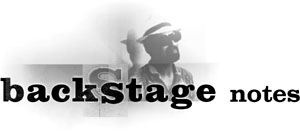 |
 |
|
|||||||||||||||||||||||||||||||||||||||||||||||||||||||||||||
 |
|||||||||||||||||||||||||||||||||||||||||||||||||||||||||||||||
|
Inside edition: It’s a mix of old and new this time out. No one would accuse Smokin’ Joe Kubek and Bnois King or Walter Trout of being traditionalists, but they’ve all got stories to tell that place them firmly on that same road that has been trod by an army of blues foot soldiers before them. (And Trout’s tale of being paid in counterfeit bills had us laughing out loud.) • • • From a generation earlier, Screamin’ Jay Hawkins was anything but traditional himself. Bill Dahl’s bio in the All-Music Guide to the Blues describes him as "an insanely theatrical figure long before it was even remotely acceptable." It’s certain that his wild tunes like "I Put a Spell on You" and "Constipation Blues" caused no end of consternation to American mothers anxious to protect their children’s delicate sensibilities. Our intrepid writing tandem of Alain Recabordé and Jeff Wiener traveled to France to interview Jay. It was pretty much the final word in self-assessment of Hawkins’ life and career, as Jay passed away soon after. • • • We’ve all heard that a picture is worth a thousand words, but in Joe Nick Patoski’s case it turned out to be several thousand. A classic shot of Jimmy Reed inspired Joe Nick to interview five musicians who were turned on by the notable bluesman’s work. This led to the fascinating oral history that takes up a large chunk of this issue. Patoski, who postulates that the universality of Reed’s music helped relax racial restrictions in the South, is a fellow musical mental patient whose work has appeared in periodicals as diverse as Rolling Stone and Mother Jones. He lives in Austin, where he is currently senior editor for Texas Monthly. He’s also the author of Selena: Como La Flor, and co-author with Bill Crawford of Stevie Ray Vaughan: Caught in the Crossfire. • • • Another artist worthy of your consideration who is definitely not "now" would be the "Lone Cat," Jesse Fuller who, like Reed, passed on in 1976. Fuller’s upbringing was practically Dickensian: According to Lester Koenig, his mother was too poor to raise him (he never knew his father) and placed him with a family named Wilson, where "he was constantly mistreated, beaten, and once was placed in a gunnysack and smoked over a fire"! But he was possessed of a warm and humorous spirit, and instead of becoming bitter, he became resourceful, learning to read and write and laboring at a remarkable variety of odd jobs, including an appearance as an extra in the 1920s movie version of The Thief of Bagdad. It wasn’t until he was in his 50s that he tried his hand as a professional musician, working as a one-man band when he couldn’t find reliable partners. During the ’60s folk revival, his song "San Francisco Bay Blues" became a staple at hootenannies and was recorded by Bob Dylan, Barbara Dane and others. Michael Dobrin helped put on Jesse’s last public concert in 1971, and he shares with us his reminiscences of this very special man. • • • Given that many blues artists have often lived an itinerant, seat of the pants existence, it shouldn’t come as too much of a shock that some of them augmented their uncertain incomes by developing a talent for gambling. Among their peers, characters like "Shakey Jake" Harris and Professor Longhair were practically as well-known for their prowess with the dice and cards as they were for their musicianship. Starting with this issue, D. Thomas Moon begins a series on the relationship between blues and gambling in the words of the musical gamesters themselves. All the news that fits: I call it the "bigger backpack theory." No matter how big a pack you buy, you always end up cramming it full of stuff. So it seems to be in publishing as well. We keep adding pages to the magazine and every issue we end up having to jam things in and leave others out. Fortunately, that’s not a problem on the Internet, where we have plenty of bandwidth on our online edition at www.bluesaccess.com. So when we do something dumb, like discover at the last minute that we neglected to lay out any space in this issue for Wayne Robins’ "Blue Again, New Again" column, we can still make it available to you in the cyber-ethers. Likewise, we’ve always prided ourselves on going the extra mile to let you know just who is actually going to be playing at all those festivals we list. This time around we came up against a conflict between doing a complete listing and having to make a significant cut in the number of reviews we’d run, or using a typeface so small that our readers would be bumping up the power on their bifocals. The compromise we settled on was to give just a few performers for each fest, but put the full slate on our web site. And, yeah, even so we still had to cut a handful of reviews. C’est la vie. CW
|
|
|